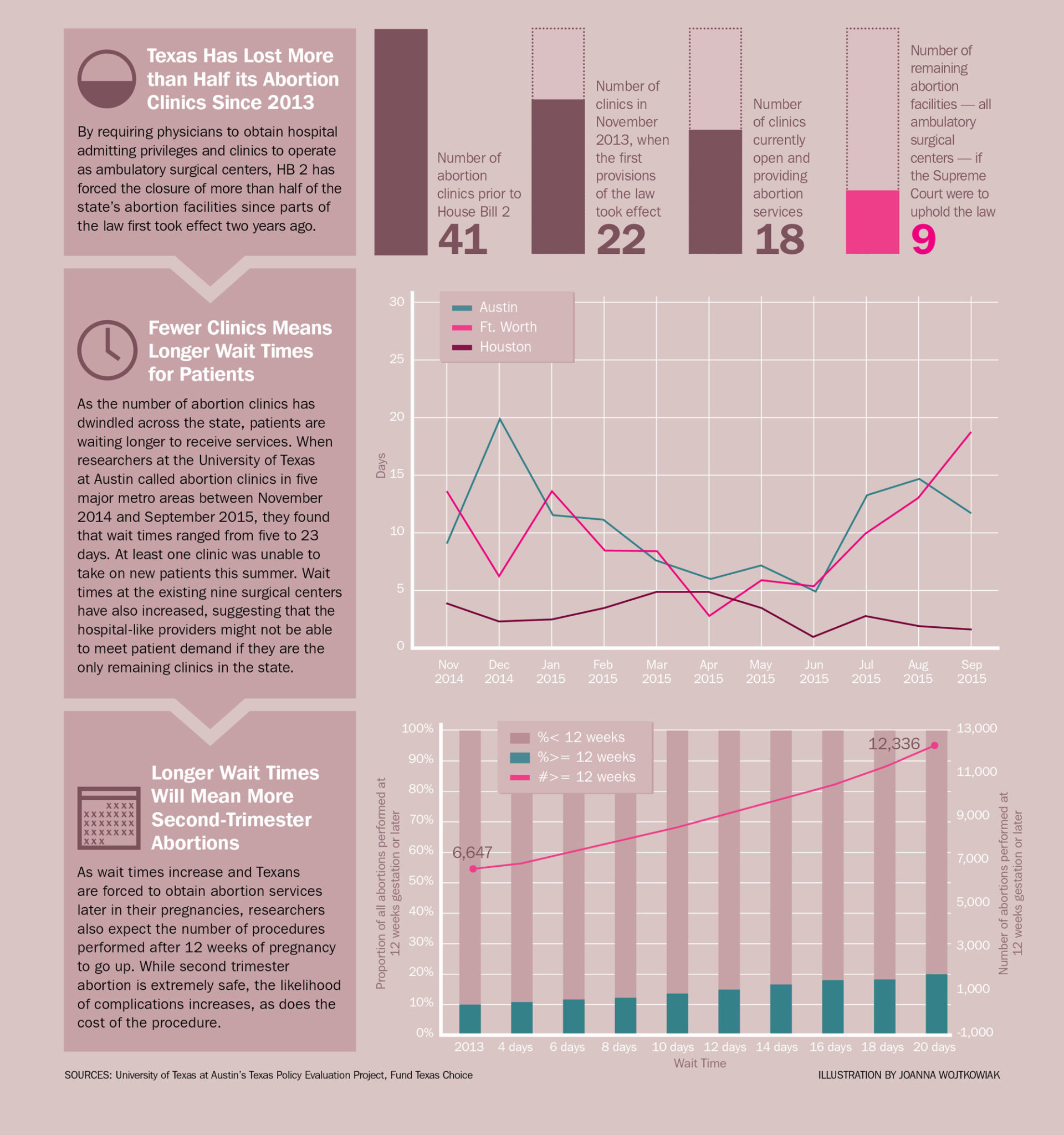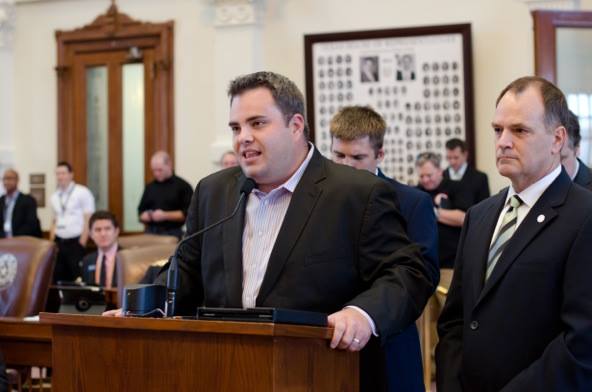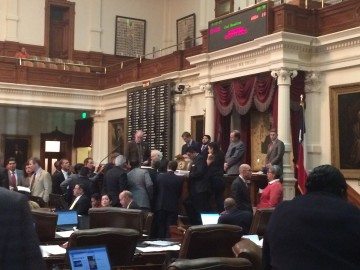
How Reproductive Health Fared in the 84th Legislature

Above: A broad provision of HB 3994 requires doctors to ask every woman who enters an abortion clinic for an ID to verify that she is not under 18.
The 2011 and 2013 legislative sessions were two of the more detrimental to reproductive health care access in Texas in decades. Four years ago, we saw major cuts to women’s health funding that resulted in thousands of women losing preventative and contraceptive services and the closure of dozens of clinics. Two years later, the Legislature passed the most restrictive abortion law in recent history, which forced half the state’s abortion clinics to close.
Going into this session, some wondered how much more the anti-abortion Texas Legislature could do. The answer: quite a bit. Here’s a roundup of how reproductive health fared in the 84th Legislature:
Abortion Restrictions for Minors
As conservative lawmakers celebrate another session of having “defended the rights of the unborn,” minors in Texas who are victims of assault, abuse or neglect are left with what may be insurmountable barriers to abortion access.
Anti-abortion legislators and right-to-life groups set their sights early in the session on judicial bypass, a legal process set up by the Texas Legislature in 1999 that allows minors who have been raped or sexually assaulted, or who don’t have a parent in their lives to provide consent, to bypass the state’s parental consent law and seek permission for an abortion through the courts.
GOP lawmakers filed four separate bills to “reform” judicial bypass, which proponents said were necessary to protect parental rights and strengthen oversight. Abortion rights groups and legal experts repeatedly warned that changes to the existing law would ultimately dismantle the rarely used yet necessary process that had been set up to protect young women.
“The bills have nothing to do with helping pregnant girls,” said Susan Hays, a family attorney who represents minors seeking judicial bypass. “[They have] everything to do with punishing them and exposing them, and therefore endangering them.”
Of the four bills, House Bill 3994 by state Rep. Geanie Morrison (R-Victoria) is the only one on its way to Gov. Greg Abbott’s desk. The bill makes a litany of changes to the process that will make it harder for minors and their attorneys to secure the bypass.
The bill also prolongs the court process—and therefore delays abortions—and jeopardizes confidentiality, especially in small rural communities where minors may be recognized at the courthouse, opponents claim.
That’s not all.
A broad provision of HB 3994 requires doctors to ask every woman who enters an abortion clinic for an ID to verify that she is not under 18. The list of approved documents includes driver’s licenses issued by Texas or another state and passports, among others. If a patient doesn’t have an approved ID, her doctor must give her instructions on where to get one. If she can’t get one, for financial reasons or because she can’t find the right preliminary paperwork, for example, the doctor can still perform the abortion, but must report to the state that the procedure was performed without age verification. That additional reporting requirement could expose providers to additional liability, abortion rights leaders argue, and deter doctors from performing the procedure at all. Elizabeth Nash, a policy analyst with the Guttmacher Institute, said Oklahoma is the only other state with an age verification requirement for abortion.
Advocates warn that the bill’s ID provision will most likely hurt poor women and immigrants.
“Providing preliminary paperwork to get the ID at all is difficult for immigrant women who have come to Texas with nothing but the clothes on their back,” said Ana Rodriguez DeFrates, Texas policy director for the National Latina Institute for Reproductive Health.
So what didn’t pass? Senate Bill 575, which would have prohibited private insurance companies from covering abortion, died after some late-night drama between House Republicans. An effort by state Rep. Matt Schaeffer (R-Tyler) to eliminate the fetal anomaly exception in Texas’ 20-week abortion ban also fell flat. A number of attempts by Democrats to ensure that women and public school students get medically accurate information when visiting a doctor or being taught sex education in school went unheeded.
On top of discussions to further restrict abortion, a troubling trend arose during abortion bill debates this session: the refusal of Republican lawmakers to consider exceptions for rape or incest victims. During both the House and Senate debates over HB 3994, attempts by Democrats to add these exemptions were shot down by Republicans without so much as a conversation.
“What we put in place here is making a very traumatic situation even more traumatic,” state Rep. Donna Howard (D-Austin) said during an impassioned plea asking Republicans to accept her amendment to HB 3994. “She can’t just tell the judge that she’s been raped, that she’s had incest committed by a family member. … She has to be re-victimized and re-traumatized to repeat the circumstances in enough detail to obtain the court order that she seeks.”
Howard’s amendment ultimately failed.
“A few years ago we didn’t have this hard a time reaching lawmakers on the need for exceptions, at least for people who are recovering or who have been attacked and become pregnant as a result,” said Chris Kaiser, staff attorney with the Texas Association Against Sexual Assault. “I’m not really sure what to attribute that to.”

When the Senate was discussing Senate Bill 575, state Sen. Sylvia Garcia (D-Houston) tried to add the exact language that passed a mere four years ago exempting rape and incest victims from part of the state’s sonogram law. It was a no-go. During floor discussion, state Sen. Donna Campbell (R-New Braunfels) tried to change Garcia’s amendment to apply only to victims who report assault or abuse to law enforcement, which Campbell claimed would “empower” victims. However, data show that more than 80 percent of Texans who are assaulted or attacked don’t report to law enforcement.
“There seems to be some disconnect there, logically,” Kaiser said.
Women’s Health and the State Budget:
State women’s health programs, which cover family planning services, cancer screenings, Pap smears and well-woman exams for poor women in Texas, are funded to the tune of $262.2 million over the next two years, about $50 million more than the current funding level.
While women’s health advocates and providers are celebrating the funding bump, ensuring there are enough providers to serve all eligible women remains a challenge.
In addition to cutting family planning funding by $74 million four years ago, the Legislature excluded Planned Parenthood from the Medicaid Women’s Health Program and categorized all family planning funding into a tiered system under which some providers receive less state money than they received in the past. As a result, clinics closed, stopped providing family planning services, or started charging for services that were once free for poor women.
While funding was restored in 2013, a report by the Texas Policy Evaluation Project shows that more than half the women in Texas who seek reproductive health services encounter at least one barrier along the way.
This session’s funding increase is a first step toward repairing the damage and recruiting more providers, women’s health advocates say. The state will also consolidate two women’s health programs into one and design new eligibility criteria. Input from women’s health providers is key to ensuring that the state is serving as many women as possible, advocates say.
“We are hopeful that providers of all kinds will be involved in that process so that it meets the needs of women,” said Janet Realini, director of the Texas Women’s Healthcare Coalition, which includes more than 40 providers, policy groups and advocacy organizations. “There are a lot of details to work out.”
The state budget once again excludes the provider from a program that has nothing to do with abortion and everything to do with life-saving cancer screenings for poor women.
Still, the Legislature continues to target Planned Parenthood. The state budget once again excludes the provider from a program that has nothing to do with abortion and everything to do with life-saving cancer screenings for poor women. The Legislature also doubled state funding for the Alternatives to Abortion program, which primarily funds crisis pregnancy centers that have been found to disseminate bad information to women with little state oversight.
Here are a few more things to note as we round up this 84th legislative session:
- House Bill 1140 by state Rep. Celia Israel (D-Austin) requires county jails to report their policies with regard to the care and treatment of pregnant inmates; and
- Despite a years-long fight, efforts to strengthen the state’s right-to-breastfeed law largely fell short this session. Only one bill, out of six related to the issue, made it out of both chambers: House Bill 786 by state Rep. Armando Walle (D-Houston). It expands accommodations and break times for public employees who need to pump while on the clock, though a last-minute amendment by state Sen. Van Taylor (R-Plano) defines a single-occupant restroom an acceptable space for mothers who need to pump at work, which breastfeeding advocates say is unsanitary.


